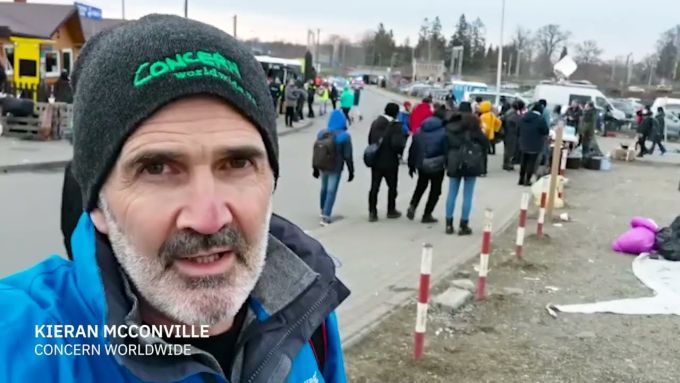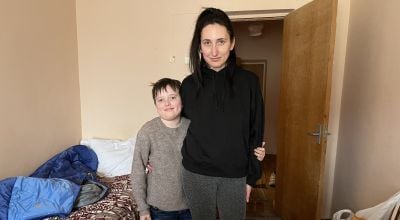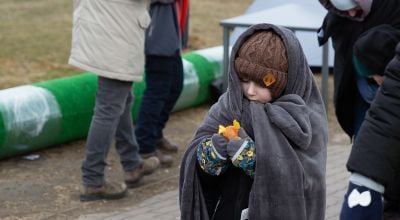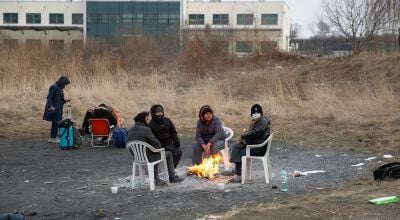
Read our 2024 annual report

Knowledge Hub
Over the past month, the world has watched in horror as conflict in Ukraine has led to death, casualties, destruction and mass displacement.
Since 24th February, 4 million Ukrainians have fled their homes, with many crossing the borders into neighbouring countries including Poland, Romania, Hungary and Moldova. Two thirds of these people are women and children, and even those who had family or friends in neighbouring countries to stay with faced leaving their beloved and hard-earned belongings behind, leaving home with just a backpack of necessities. Others fled without connections, guaranteed refuge or resources, and face an uncertain future.
But it’s not just the millions that have fled Ukraine who have been affected by this conflict. UNCHR data estimates that 6.5 million people have been displaced inside Ukraine itself; although the number may actually be closer to 8 million. While they have not left the country, these people have been forced to leave their homes, towns, cities and families, and may not know if they can ever return.


Concern's response
On 28th February, Concern deployed an emergency response team to Poland to conduct an initial assessment to determine our response. Here, we saw the influx of Ukrainians across the border, with people boarding buses to venture further into Poland or into Europe. We also completed vital assessments in Moldova, Hungary, Slovakia and Romania.
As a result of these assessments, we determined that the need is greatest inside Ukraine, and are focusing our efforts here.
We are doing this by working with our Alliance2015 partners, and using funds from the extremely generous donations of the Irish, UK, US and South Korean publics to meet the needs of Ukrainians affected by this conflict.
What is Alliance2015?
Alliance2015 was founded in 2000 to work towards achieving the Millennium Development Goals, and is a network of seven European NGOs. Concern Worldwide works alongside ACTED (France), Ayuda en Accion (Spain), Cesvi (Italy), HELVETAS (Switzerland), People in Need (Czech Republic) and Welthungerhilfe (Germany) to respond to humanitarian crises and work towards eradicating poverty.
While Concern has experience in dealing with refugee crises around the world, including the crisis in Kosovo and Albania in 1999, prior to the conflict in Ukraine we did not have a presence here. However, two of our Alliance2015 partners, ACTED and People in Need (PiN), have worked in Ukraine since 2014, and have well established relationships with local authorities and NGOs. Therefore, Concern is supporting ACTED and PiN as they deliver a 12-month intervention in Ukraine.
A quarter of Ukraine’s population is on the move – the equivalent of twice the number of people on the island of Ireland. The sheer scale is unprecedented. We will work to support those in transit and those who can no longer keep moving.
Our programme in Ukraine
This 12-month intervention began on 15th March, and Concern has committed €2 million to this joint intervention. €1.5 million of this funding comes from the first allocation of our Disasters Emergency Committee (DEC) funding. (Concern is one of 15 member charities of the DEC; the DEC Ukraine appeal has already raised in excess of £200 million.)
The intervention consists of three main activities, which will help Ukrainians who remain in Ukraine with rent, food, hygiene and psychosocial support.
Kits
Concern and our Alliance2015 partners aim to provide:
- 8,000 NFI (non-food item) kits, including bed linens, pillows, blankets, cutlery, tableware, a kitchen knife, a cooking pot and a teapot.
- 5,000 household and institutional hygiene kits, including soap, washing powder, toilet brushes, rubber gloves, paper towels and hand sanitiser.
- 200 baby hygiene kits, including nappies, soap bars, baby wipes, baby powder and moisture cream.
We are also establishing smaller satellite warehouses to complement established warehouses in Rzeszow in Poland, and Lviv and Chernivtsi in Ukraine, to deliver aid directly to areas affected by the conflict.
Cash
Collective centres
What's next?
As this first intervention is being implemented, Concern is continuing our assessments in Ukraine to determine how we can further help those most in need.
Along with our partners Cesvi and Welthungerhilfe, we have sent a team into Ternopil (on the border of Lviv) and Khmelnytskyi (next to Ternopil) - two areas that have very high levels of displacement and in which relatively few NGOs are currently working.
In the first stage of the work in these two areas, we intend to focus on giving support to collective centres, and to then establish cash transfer and NFI distribution programmes.


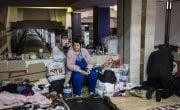
What can I do to help?
We have been amazed by the generosity of the public in donating to our Ukraine crisis appeal. This money will go towards the needs of Ukrainians affected by this conflict.
However, as our head of emergency operations Ros O’Sullivan said on Newstalk, “This is a conflict and an emergency that is not going to end quickly. 10 million people don’t easily get to go home and rebuild their lives.”
We need your continued support to ensure that we can help those most in need.



